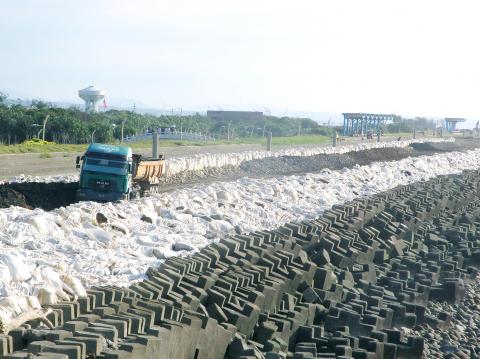The northwestern seashore, from Taoyuan County to Hsinchu County, is retreating as a result of human activity, the Ministry of Economic Affairs’ Central Geological Survey (CGS) said.
The latest survey report, released last year, showed that the coastline south of Datan Village (大潭) in Guanyin Township (觀音), Taoyuan County, and the section of coastline from Hukou Township (湖口), Hsinchu County, to Siangshan District (香山) in Hsinchu City was retreating.
CGS Director Lin Chao-tsung (林朝宗) said such erosion could have been caused by manmade structures along the coast, such as the Datan Power Station and the Hsinchu Fishing Harbor.

Photo: Hung Mei-hsiu, Taipei Times
While some sections of Taiwan’s coastline are retreating, the report shows there are also sections of shoreline pushing outward into the sea.
As manmade structures change the course of rivers, the sand and soil carried downstream settles only on the banks of a river mouth without manmade structures, making coastlines shrink on one side, but grow on the other, he said.
Under normal circumstances, the coastline should be growing evenly, Lin said.
The CGS said the government should take a series of measures to prevent extensive shrinking of coastlines.
Although concrete blocks are now piled along coastlines to prevent erosion, Lin said that concrete blocks would only work for a limited period of time and erosion would still occur sooner or later.
He said the best way to prevent erosion would be to make better plans before building anything along the coast.
The latest report released by the Ministry of the Interior’s Construction and Planning Agency showed that as of last year, Taiwan had 1,321.9km of coastline, or 3km more than in 2008. However, this was the result of manmade structures, as cemented coastline — including embankment, harbor and reclaimed lands — had grown 3km since 2008.
At the moment, 55.5 percent of Taiwan’s coastline has been cemented, about 0.1 percent more than in 2008.
As climate change progresses, sea levels continue to rise, Lin said, and the concept of reclaiming land from the sea should be changed, since experts are becoming more uncertain about how long manmade structures will last.

CHANGING LANDSCAPE: Many of the part-time programs for educators were no longer needed, as many teachers obtain a graduate degree before joining the workforce, experts said Taiwanese universities this year canceled 86 programs, Ministry of Education data showed, with educators attributing the closures to the nation’s low birthrate as well as shifting trends. Fifty-three of the shuttered programs were part-time postgraduate degree programs, about 62 percent of the total, the most in the past five years, the data showed. National Taiwan Normal University (NTNU) discontinued the most part-time master’s programs, at 16: chemistry, life science, earth science, physics, fine arts, music, special education, health promotion and health education, educational psychology and counseling, education, design, Chinese as a second language, library and information sciences, mechatronics engineering, history, physical education

DEADLOCK: As the commission is unable to forum a quorum to review license renewal applications, the channel operators are not at fault and can air past their license date The National Communications Commission (NCC) yesterday said that the Public Television Service (PTS) and 36 other television and radio broadcasters could continue airing, despite the commission’s inability to meet a quorum to review their license renewal applications. The licenses of PTS and the other channels are set to expire between this month and June. The National Communications Commission Organization Act (國家通訊傳播委員會組織法) stipulates that the commission must meet the mandated quorum of four to hold a valid meeting. The seven-member commission currently has only three commissioners. “We have informed the channel operators of the progress we have made in reviewing their license renewal applications, and

The High Prosecutors’ Office yesterday withdrew an appeal against the acquittal of a former bank manager 22 years after his death, marking Taiwan’s first instance of prosecutors rendering posthumous justice to a wrongfully convicted defendant. Chu Ching-en (諸慶恩) — formerly a manager at the Taipei branch of BNP Paribas — was in 1999 accused by Weng Mao-chung (翁茂鍾), then-president of Chia Her Industrial Co, of forging a request for a fixed deposit of US$10 million by I-Hwa Industrial Co, a subsidiary of Chia Her, which was used as collateral. Chu was ruled not guilty in the first trial, but was found guilty

Taiwan People’s Party (TPP) Chairman Huang Kuo-chang (黃國昌) yesterday appealed to the authorities to release former Taipei mayor Ko Wen-je (柯文哲) from pretrial detention amid conflicting reports about his health. The TPP at a news conference on Thursday said that Ko should be released to a hospital for treatment, adding that he has blood in his urine and had spells of pain and nausea followed by vomiting over the past three months. Hsieh Yen-yau (謝炎堯), a retired professor of internal medicine and Ko’s former teacher, said that Ko’s symptoms aligned with gallstones, kidney inflammation and potentially dangerous heart conditions. Ko, charged with